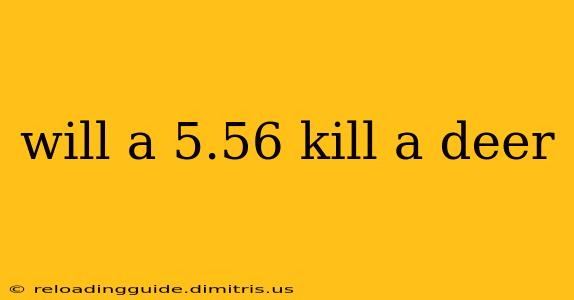Will a 5.56 Kill a Deer? A Comprehensive Look at Caliber, Placement, and Ethics
The question of whether a 5.56 NATO round can kill a deer is complex, going beyond a simple yes or no. While it's capable of killing a deer, several factors significantly influence its effectiveness and ethical implications. Let's delve into the details.
The 5.56 Round: Ballistics and Capabilities
The 5.56x45mm NATO cartridge, commonly used in AR-15 style rifles, is known for its velocity and flatter trajectory. This translates to a relatively small diameter bullet traveling at high speed. However, its energy transfer compared to larger calibers like .308 Winchester or .30-06 Springfield is noticeably less. This means achieving a clean, quick kill depends heavily on shot placement.
Shot Placement: The Crucial Factor
Accurate shot placement is paramount when hunting deer with any caliber, but it's especially critical with the 5.56. A well-placed shot to the vital organs—heart and lungs—is essential for a humane and quick kill. Marginal shots, even if they hit the animal, are more likely to result in a wounded and suffering deer. This necessitates precise aiming and marksmanship skills beyond those required for larger calibers.
Factors Affecting Effectiveness
Several factors influence the effectiveness of a 5.56 round on deer:
-
Bullet Weight and Construction: Heavier bullets generally transfer more energy, increasing the likelihood of a clean kill. Different bullet constructions (e.g., hollow point, soft point, full metal jacket) also affect expansion and tissue damage. Choosing the right ammunition for hunting is crucial.
-
Range: The 5.56 round's energy decreases significantly with distance. Accuracy and effectiveness drop considerably at longer ranges, making close-range shots essential for ethical hunting.
-
Deer Size: Larger deer naturally require more energy for a quick kill. A 5.56 might be suitable for smaller deer, but ethical concerns increase with larger animals.
Ethical Considerations: Responsible Hunting
Using a 5.56 for deer hunting raises ethical questions. The potential for a less-than-instant kill due to lower energy transfer and the need for perfect shot placement highlights the responsibility of the hunter. Responsible hunting prioritizes a clean, quick kill to minimize the animal's suffering. If you lack confidence in your ability to consistently deliver accurate, vital shots, choosing a more powerful caliber is ethically preferable.
Conclusion: A Qualified "Yes," with Caveats
A 5.56 round can kill a deer, but it requires exceptional marksmanship and a clear understanding of its limitations. Prioritizing ethical hunting practices, including shot placement, ammunition selection, and range considerations, is paramount. Hunters should carefully assess their skill level and the size of the deer before choosing the 5.56 for hunting. If you're unsure, a larger caliber offering better stopping power and a higher margin for error is strongly recommended. Ultimately, responsible hunting is about ensuring a quick and humane kill, not just the ability to harvest an animal.

